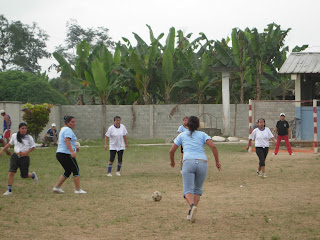At our first practice I was relieved to discover that I was not the worst player on the team, we were all pretty bad. Except for the girls who are in high school, these women were never given the opportunity to play in a formal league. Until recently playing sports was seen as something “unwomanly” and there is a derogatory name (machona) for women who “act like men.” Best then to leave it to the men and boys. But that is an old fashioned way of thinking and today there are boys and girls teams for elementary and high school students. Still, since we practice from five to seven in the evenings one of my teammates who is married with children reminds us to have supper ready before we come to practice. And we’ve definitely lost some potential teammates because husbands or mothers didn’t want them to participate.
Realizing that most of my teammates had never played an organized sport, I knew we had our work cut out for us. But what they lacked in skill they made up for in spirit. Over the course of a few weeks I saw them grow in skills and confidence. We held our own in practice games against the guys and the high pitched screams and screeching that ensued whenever they had to kick the ball were much more infrequent now. Even I had improved to the point were I was scoring goals and stealing the ball from my opponents. I consider becoming known as the gringa that can play indor one of my greatest accomplishments in PC thus far.
But an even greater accomplishment related to joining this team was when we were discussing the possible team name and I successfully made a pun in Spanish (remember dork > athlete). I suggested that since we were the underdogs we should dress in purple and call ourselves “Las De Moradas,” since morada means purple and demora means to take a long time. Also, a third meaning may be added after a particularly rough game where we all got beat up pretty badly, because morada is also the word for bruised. While everyone enjoyed the pun (not as much as I did, but still) they went ahead and bought light blue shirts and we go by the name ¨Luz del Mar¨(light of the sea).
 Left: Me, as red as a tomato. Below: My teammates attempt to score
Left: Me, as red as a tomato. Below: My teammates attempt to score
But our light isn´t shining too brightly at the moment. We´ve lost every game so far. The two games I was there for were just pathetic. Our goalie basically scored for the other team at one point and we lost badly to two really bad teams, which shows how bad we are. I still revel in the fact that I´m actually one of our better palyers, which if you know how unathletically gifted I am, is rather funny. I´m kind of waiting for one of those 80´s movie montages where we start out as this horrible team and then through perseverance, training and maybe John Cusack is involved somehow, we get better and better until we win the championship and I´m being hoisted up on the shoulders of John Cusack.
But back to reality. I’m glad to have this opportunity to bond with a diverse group of Ecuadorian women who are improving their self esteem, getting exercise and having fun. The work of goal one (the more technical work, starting a project, etc.) can be slow and incredibly frustrating at times. Making goals while working on goal two (a better understanding of your host country´s culture) has helped me relieve stress and make connections with people I may never have gotten to know otherwise. Score.

Fresa is also a soccer fan, here she shows her support for Ecuador, she has given up cheering for ¨Luz del Mar¨because she´s embarrassed.